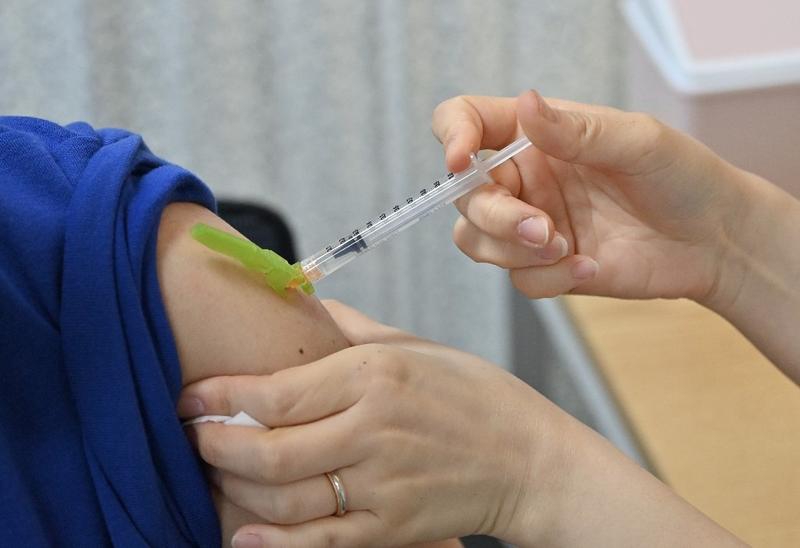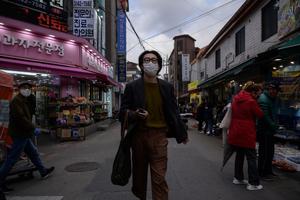 A medical worker receives the second dose of the Pfizer-BioNTech COVID-19 vaccine at a vaccination centre in Seoul on March 20, 2021. (JUNG YEON-JE / POOL / AFP)
A medical worker receives the second dose of the Pfizer-BioNTech COVID-19 vaccine at a vaccination centre in Seoul on March 20, 2021. (JUNG YEON-JE / POOL / AFP)
Vaccine boosters could hold the key for South Korea to counter its latest COVID-19 resurgence, experts say, as authorities in the East Asian nation decided not to reinstate social distancing rules despite daily new infections hitting a two-month high.
“If you want to just maintain a sort of protective level against the infection, we have to get the vaccination at least every six months or so,” said Kim Seung-taek, head of the Zoonotic Virus Lab at Institut Pasteur Korea, a research center in Seongnam city.
The new set of measures was announced as South Korea is dealing with another wave of infections, driven by the fast spread of the highly transmissible Omicron subvariant BA.5
This is because the antibody level will decline three or four months after the vaccination.
Though the existing vaccines are developed based on the original COVID-19 virus, which is not circulating in South Korea anymore, Kim said they are still very effective in protecting people from having severe symptoms and death.
ALSO READ: S. Korea's PM warns of virus surge, cases hit 2-month high
South Korean Prime Minister Han Duck-soo said on July 13 that the government will expand the booster shot program by allowing people aged 50 and older to receive the fourth COVID-19 vaccine dose, Yonhap News Agency reported. People aged 18 and older with underlying health conditions are also eligible for the expansion.
People who are infected with COVID-19 will still need to undergo seven-day quarantine, while the indoor mask-wearing mandate will remain in place.
The new set of measures was announced as South Korea is dealing with another wave of infections, driven by the fast spread of the highly transmissible Omicron subvariant BA.5.
“With the spread of BA.5 mutations, the resurgence is starting faster than originally expected,” Han said, noting that daily infections are expected to top 200,000 between mid-August and end-September.
The country reported 39,196 new COVID-19 cases on July 14, bringing the national tally to 18,641,278, according to data from the Korea Disease Control and Prevention Agency, or KDCA.
The daily number was more than double from what was recorded a week earlier but slightly lower compared to the 40,266 cases recorded the previous day, which was the first time the daily count exceeded 40,000 since May 11.
ALSO READ: S.Korea's ruling party suspends leader's membership for 6 months
The number of severe cases came to 69, up 2 from the previous day. Sixteen more deaths were confirmed, leaving the death toll at 24,696 and the total fatality rate at 0.13 percent.
The BA.5 subvariant is expected to become a dominant variant in South Korea soon. About 35 percent of infections recorded last week were caused by BA.5, up from 28.2 percent a week earlier, KDCA data showed.
Though the number of daily COVID-19 cases is increasing quickly, Kim Tark, professor of infectious diseases at Soonchunhyang University Bucheon Hospital, told China Daily that the peak of the current resurgence will see case numbers not more than half of that recorded in the previous Omicron wave fueled by subvariants BA.1 and BA.2, which peaked in March at over 600,000 daily cases.
 A man wearing a face mask amid concerns over the COVID-19 novel coronavirus walks through a market in Seoul on April 22, 2020. (ED JONES / AFP)
A man wearing a face mask amid concerns over the COVID-19 novel coronavirus walks through a market in Seoul on April 22, 2020. (ED JONES / AFP)
Lower numbers are expected in the peak of the current wave “because people have already experienced a huge outbreak”, the professor said.
About 87 percent of South Korea’s population, or more than 44 million people, have been fully vaccinated with two doses, while over 65 percent received their third shot
With vaccination rollout, South Korea should be able to overcome the current resurgence by forming proper response from the healthcare system and avoid reapplying social distancing rules and restrictions on international travel, the public health expert said.
About 87 percent of South Korea’s population, or more than 44 million people, have been fully vaccinated with two doses, while over 65 percent received their third shot.
KDCA said the rate of suspected reinfection among confirmed cases reached 2.87 percent in the week to July 2, up from 0.59 percent in the first week of May.
Noting there are some studies about the potentially higher health risks of getting reinfected, Kim Seung-taek from the Institut Pasteur Korea said reinfection does not necessarily mean more severe symptoms.
ALSO READ: South Korea steps up security after Abe killing
“It is kind of premature to just conclude that reinfection increases the severity of (diseases) by COVID-19,” he said, noting it should be evaluated case by case.
The expert said he is only concerned about whether the public can accept to get vaccinated in a high frequency to maintain a strong immunity against COVID-19.
In addition to its current wave, South Korea detected on July 14 its first suspected case of the new Omicron subvariant BA.2.75, which was first sequenced in India in May and has been found in around 10 countries.
Noting that BA.2.75 is not an official name yet for the new strain, Soumya Swaminathan, chief scientist of the World Health Organization, said on July 5 that it is still too early to know if this subvariant has “properties of additional immune invasion” or being more clinically severe.


